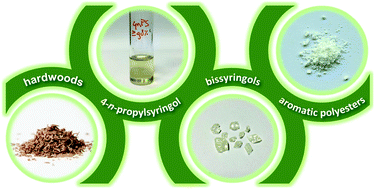Promising bulk production of a potentially benign bisphenol A replacement from a hardwood lignin platform†
Abstract
A full lignin-to-chemicals valorisation chain – from hardwood over bissyringols to aromatic polyesters (APEs) – is established for renewable 4-n-propylsyringol (PS), the main product from catalytic hydrogenolysis of (native) hardwood lignin. To do so, reagent-grade PS was produced from birch wood via reductive catalytic fractionation (RCF) and isolated in 34 wt% yield on lignin basis. Additional early-stage theoretical calculations, based on both relative volatility (α) and distillation resistance (Ω) as well as Aspen Plus® simulations, predict that the isolation of PS by means of distillation is economically feasible at industrial scales ($85–95 per ton of propylphenolics at 200–400 kt a−1 scale). Subsequent stoichiometric acid-catalysed condensation with formaldehyde unveils a remarkably high 92 wt% selectivity towards the dimer 3,3′-methylenebis(4-n-propylsyringol) (m,m′-BSF-4P), which is isolated in >99% purity by facile single-step crystallisation. The striking dimer selectivity is ascribed to the synergetic interplay between the activating methoxy groups and the oligomerisation-inhibiting propyl chain. Next, an in vitro human oestrogen receptor α (hERα) assay was performed to ensure safe(r) chemical design. The bissyringyl scaffold displays reduced potency (∼19–45-times lower affinity than bisphenol A) and lower efficacy (∼36–45% of BPA's maximum activity). Lastly, to assess the functionality of the safe(r) bissyringol scaffold, it was converted into an APE. The APE displays a Mw = 43.0 kDa, Mn = 24.4 kDa, Tg = 157 °C and Td,5% = 345 °C. In short, (i) the feasibility and scalability of the feedstock, (ii) the simplified process conditions, (iii) the reduced in vitro oestrogenicity, and (iv) the functionality towards polymerisation, make this bissyringol a renewable and potentially benign bisphenol replacement, capable for production at bulk scale.



 Please wait while we load your content...
Please wait while we load your content...